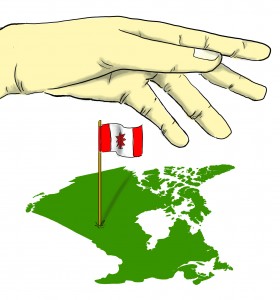Libertarianism: a political solution

It’s becoming increasingly obvious that the old left-right arrangement of political parties is coming undone. The United States has essentially rejected third-party candidates, but the Republican party is breaking down.
The Tea Party badly split the right wing along religious and fiscal priority lines. And presidential candidate Mitt Romney’s lukewarm pandering has only alienated the traditional voters.
It is time for a new paradigm to come onto the political scene. The answer is libertarianism. Libertarianism is a political philosophy that seeks to reduce the role of the state in the lives of individuals. It’s descended largely from classical liberalism and has been increasing in profile for years.
Libertarians believe that the state ought to have little to no power. They argue that if an action is not inherently harmful to another, then it shouldn’t be made illegal by the state, and that human beings have the right up to the point where their actions intrude upon the rights of another.
Does drug prohibition seem ineffective, harmful and oftentimes violent? Does prostitution seem like something people ought to be able to engage in at their own discretion, supposing both parties freely consent? Does gun control seem too intrusive to be justified? Have you ever wondered why government intervention in the economy seems to favour lobbyists rather than the common people? For all its posturing, government seems terminally unable to actually solve any economic problems or help people effectively.
These are all typically libertarian attitudes. The simplest way of classifying the position is as social liberals—those who believe that the state should not interfere in the private lives of citizens—and fiscal conservatives—those who believe that a free market produces the most favourable results for most people.
Now that generalization obscures a lot of the diversity within the movement, as the libertarian movement is known for its internal arguments and rival classifications.
Minarchists believe in an absolutely minimal state, one that exists only to provide security and judicial services while anarcho-capitalists believe in a stateless society where competitive security and justice firms compete for business.
They remove the state’s monopoly on the use of force and seek policing as another commodity, like insurance. The Austrian school of economics is aligned almost entirely with libertarian causes, based on the works of figures like Ludwig von Mises, Robert Murphy and more controversially, F.A. Hayek. The Chicago school is more mainstream and is best symbolized by Milton Friedman.
Despite this internal fracturing, the libertarian movement presents a credible alternative to the worldviews that currently dominate the political scene. Ron Paul, famous for his grassroots campaigning and fundraising, has introduced thousands of youth to the ideas of liberty.
Once an isolated movement, libertarianism is now a serious political force with public exposure through people like John Stossell, Drew Carey and Penn Jillette. Libertarianism is most popular in the United States, given the country’s history of distrust for government and classical liberalism. However, the position does exist in Canada.
It wouldn’t be fair to give the impression that libertarianism is a complete and fully correct ideology.
Like all ideologies, it is forever changing and being questioned. But it’s an important one, that has been rising in statue for years and I believe that the movement’s time has come.
letters@thecord.ca


